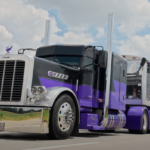Three major truckload companies’ training departments are seeking an exemption from federal regulations concerning entry-level driver training. They argue that adhering to these rules is causing a shortage of both instructors and drivers.
The three companies involved are Heartland Express (NASDAQ: HTLD), Contract Freighters Inc. (CFI), and Millis Transfer (which was acquired by Heartland Express in 2019). Drivers from these companies undergo training at Millis Training Institute (MTI), which is the training division of Millis Transfer.
On behalf of the three companies, MTI has formally requested the Federal Motor Carrier Safety Administration to grant them an exemption from the requirement that behind-the-wheel (BTW) training instructors must have a minimum of two years of experience driving a commercial motor vehicle or two years of experience as a BTW instructor.
“MTI has had CDL training since 1991 and has always required our ‘OTR’ [over the road] trainers to have one year minimum experience in order to train our students,” wrote MTI Training Director William Griffin in the companies’ exemption application. “We have an extensive ‘safety evaluation’ process and only those that pass our evaluation process will be allowed to train. We have been extremely successful with this policy.
“At present time, since February of 2022, we have had very little success in getting enough trainers to take and train our students due to the two-year BTW rule, hence the reason we are requesting this exemption.”
Griffin projected that the student enrollment for the three companies at MTI in 2023 would range from 500 to 700 students.
“We currently only have 131 trainers, so with each trainer spending up to 90 days with a student before letting them go solo, you can see the companies are going to need to turn students away because of the shortage of trainers,” he said.
“If we are denied this exemption, we are all in agreement that our schools would suffer, hence reducing the growth of our companies and therefore reducing the number of safe drivers that we could potentially put on the road with a career in trucking and reducing the shortage of truck drivers.”
As per federal regulations, when seeking exemptions from FMCSA regulations, applicants are required to submit an application that includes a safety impact assessment of the exemption. Additionally, they must provide a detailed explanation of how an equal or higher level of safety would be maintained if the exemption were to be granted. This ensures that any potential exemptions do not compromise safety standards and that appropriate measures are in place to uphold safety during the exemption period.
“We believe our Trainer Evaluation process is second to none,” Griffin asserted in addressing the safety aspect of the exemption.
“Our trainers must have no safety violations, must be able to communicate the importance of safety and demonstrate all aspects of our safety protocols as well. We are certain that our trainers and training will be a positive contribution to highway safety.”
He added, “I have no research reports or technical papers, just a sincere request from a 40-plus-year trucking veteran who is trying to keep our programs running smoothly.”





